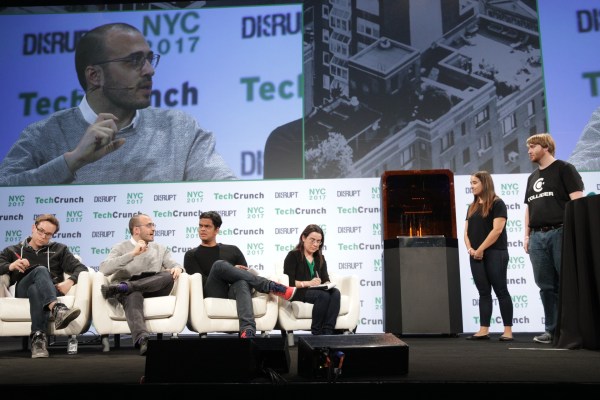When he worked at Shapeways just a few years ago, customers constantly asked Graham Bredemeyer if they could get their designs made out of metal by the 3D printing services firm. Think about it — if a plastic Yoda is covetable, a titanium one is even better.
However, most 3D printers could not yet handle alloys like sterling silver or stainless steel in 2014. And to this day, 3D printers that make metal objects don’t generate the same smooth quality surfaces as traditional injection molding.
Now, Bredemeyer has formed a startup called Collider to fulfill makers’ wishes. The company’s flagship printer Orchid, which is still in a production-prototype stage, is compact, safe and affordable enough for use in offices or labs. It makes metal objects that are on par with injection-molded.
Here’s how the machine works, according to Collider co-founders Bredemeyer and president Cacky Calderon: users open Collider’s software and can upload any industry-standard, digital 3D design model to get started. After tweaking their design file, they insert a material cartridge into the printer and it churns out a shell, or mold, of the model.
The Collider printer then fills each mold with a mix of metal powders and a liquid binder from “off the shelf” cartridges. The printer can also fill a mold with materials like silicone or other polymers. The company plans to resell others’ cartridges, and make its own, at least for the mold-materials.
Next, users remove a build plate from the machine, with the filled mold sitting atop it, and put them into a warm water bath to dissolve the shell. They take the cured metal part out of the shell and put it into the Collider’s furnace, which sinters the metal, burning off any binder-resins that were in it. (Plastic parts do not need to be sintered.)
Once the process is complete the user is left with a shiny metal object, Yoda figurine, sprocket or whatever else.
“We’re an automated system that looks like a 3D printer but at the end of the day we are an injection-molding system. So this is a more familiar thing in terms of the design guidelines that manufacturers are already working with,” the CEO said.
Although 3D metal printing is not yet pervasive, Collider is facing significant competition in the market, especially from Desktop Metal. Other additive manufacturing companies have developed machines capable of 3D metal-printing. But most are far out of the price range of a studio or lab, or extrude metal powders into layers then bake them. This method leaves objects with visible layers and a matte finish.
Collider promises the ability to handle multiple materials with one machine, structural integrity on par with injection molding processes, and a smooth aesthetic. Based in Chattanooga, Tennessee with five full-time employees, Collider aims to lease its printers to service bureaus (like Shapeways) and small regional manufacturers, labs or rapid prototype shops.
Collider president and co-founder Cacky Calderon said the company is now recruiting beta customers primarily from labs at universities, and rapid prototyping shops. These organizations are most likely to want to try new additive manufacturing tech first, and to help a startup like Collider perfect various features of their software, materials and machines, she said.
